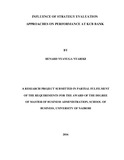| dc.description.abstract | The objectives of the study were to establish the strategic evaluation approaches adopted
by KCB bank and to determine the influence of strategic evaluation approaches on
performance of KCB bank. The study was guided by agency theory, and open systems
theory. The target population of the study was the KCB bank’s staff, top management,
middle management and subordinate staff. This research was a case study. The research
study used an interview guide to collect data. The data collected was analyzed using the
content analysis technique. The study concludes the strategy evaluation practices
identified at KCB bank to include bench marking, internal audits, balanced score card,
performance appraisals, accreditations and certifications, customer satisfaction surveys
and the use of information technology programs. The challenges that were identified in
the study in the evaluation of strategies include; an ineffective performance management
system, formulation of inappropriate performance indicators, data collection and
reporting systems and evaluation and review mechanisms, flawed objective setting
process, lack of proper training of staff on performance management and evaluation, Poor
internal communication, lack of information on the outcomes of evaluation and control
actions, no established clear reporting schedules, channels and feedback mechanisms,
low staff commitment ,resistance to change , lack of ownership ,Integrity issues ,
incorporation of incorrect information or lack of adequate information so as to make
objective conclusions, lack of training in strategy evaluation and control practices, Poor
support services, inadequate resources, poor infrastructure, testing and certification
organizations, and lack of cooperation from KCB bank stakeholders. The study concludes
that the benefit of a strategy evaluation is that it facilitates effective decision making,
better selection of tactical options and teamwork. It can also be concluded that strategy
evaluation helps in clearly defining the purpose of the organization and to establishing
realistic goals and objectives consistent with that mission in a defined time frame within
the organization’s capacity for implementation which aids in effective decision making
policies. The study recommended that KCB bank develops an effective strategy
evaluation framework. The KCB bank evaluation system should provide for an annual
assessment of the results arising from the implementation of the plan, with the aim of
establishing if organizational objectives are met according to the plan. In addition to the
internal evaluations, a mid-term review of the Plan should be undertaken yearly and at
the end of the planned period. | en_US |



